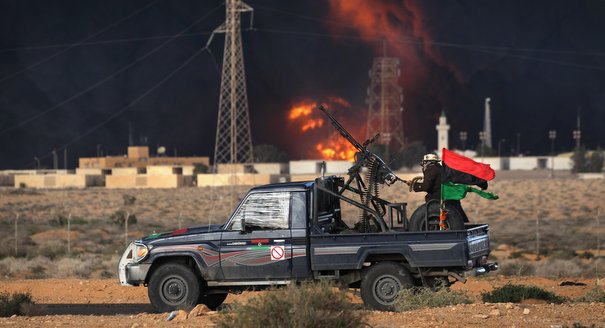On the fourth anniversary of Russia’s full-scale invasion, Carnegie experts discuss the war’s impacts and what might come next.
- +1
Eric Ciaramella, Aaron David Miller, Alexandra Prokopenko, …

Source: Getty
After their experience in the campaign in Libya, Europeans will have to decide to either develop a unified security and defense identity or, given recent expenses and difficulties, abandon such efforts altogether.
The war in Libya may be one of those quietly telling moments in the history of more important nations. For the first time, the United States has taken a secondary role—“leading from behind,” if “leading” is even the right word—in a war prosecuted by NATO and driven by Great Britain and France, the two strongest military powers in Europe.
But oh what a war! Seven budget-busting months against one of the weakest militaries in the world, with shortages of planes, weapons, and ammunition that were patched over by the pretense that NATO was acting simply to “protect civilians,” when it was clear to everyone that the Alliance was intervening on one side of a civil war. All resemblances to the Kosovo war, of course, are a priori inadmissible. That was the war when NATO said: “Such a success, never again!”
Yet here we are—with the “responsibility to protect” the new mantra, replacing Kosovo’s “humanitarian intervention.” Both, of course, are highly debatable, to use delicate language, given the failure to intervene in Chechnya then and Syria, Bahrain, or Yemen now.
Libya was a war in which some of NATO’s mightiest members did not participate—or did not participate with combat aircraft, like Spain and Turkey. It was a war where the Danes and Norwegians did an extraordinary amount of the combat sorties, given their size. Their planes and pilots became exhausted even as the French finally pulled back their sole nuclear-powered aircraft carrier for overdue repairs and Italy withdrew its aircraft carrier to save money.
Only eight of the 28 allies sent combat forces and most ran out of ammunition, having to buy, at cost, ammunition stockpiled by the United States. Germany refused to take part, even in setting up a no-fly zone.
And although Washington took a back seat in the war, which the Obama administration looked at skeptically from the start, the United States still ran the initial stages, in particular the destruction of Libya’s air defenses, making it safe for its NATO colleagues to fly. The United States then provided intelligence, refueling, and more precision bombing than Paris or London want to acknowledge.
Inevitably, then, NATO airpower and technology, combined with British, French, and Qatari “trainers” working “secretly” with the rebels on the ground, have defeated the forces, many of them mercenary, of Colonel Muammar Qaddafi.
As of this writing, there are still important pockets of resistance, but the war has been won.
The question, however, is whether European members of NATO will ever decide to embark on such an adventure again.
The experience of Libya, it seems to me, will have one of two responses. Either Europeans will develop the security and defense identity they have advertised for so long, so Europe can have its own credible voice in a world not only run by soft power, or given the expense and difficulties of defeating even Libya, they will simply stop trying. The jury is out, but the verdict is important.
Some, like Tomas Valasek of the Centre for European Reform, suggest that Washington’s diplomacy worked, in that during the Libyan conflict, “the allies established a new division of labor for NATO operations on Europe’s borders, which should be encouraged.”
Possibly. And just possibly, given the cost and strain of the Libyan operation, combined with the vital necessity to cut budget deficits at home to save both the eurozone and themselves, even the eight European nations that fought will decide that a real European security and defense identity is too expensive, and their already shrinking defense budgets will continue to shrink past the point of utility—at least to Washington. After all, the European Union itself played no role at all in the war.
François Heisbourg, a French defense analyst with the Foundation for Strategic Research in Paris, said that the decisions made in Washington and Berlin will have “major strategic consequences for both NATO and the European Union.”
The lack of a sustained American “shock and awe” campaign probably left more of Libya’s infrastructure intact for the new government, he noted. But less happily, he said, “if ‘leading from behind’ becomes the rule rather than the exception,” which he regards as likely given U.S. budget cuts, “then European force planners will have to invest” in air-defense suppression and more close-air support.
And how likely, after all, is that? And if France, Britain and others do invest more in these areas, they will have to cut in others, and will be less likely to engage in over-the-horizon expeditions like the war in Afghanistan.
So Libya may be a dark model for NATO’s future: internal coalitions of the willing, hemmed in by conditions and national “caveats,” running out of ammunition and targets, with inadequate means to stated political goals.
The economic crisis has only exacerbated Europe’s unwillingness to live up to its grand ambitions to play a global role in foreign and defense matters. The biting complaints of former U.S. defense secretary Robert Gates about the fading of Europe and a “dim if not dismal future”’ for an increasingly “irrelevant” Alliance were only an echo, if said more harshly, of similar speeches that many NATO secretary-generals have made before him.
In February, at the Munich Security Conference, NATO’s current head, Anders Fogh Rasmussen, ominously noted that in the last two years alone, European defense spending had shrunk by $45 billion—the equivalent of Germany’s entire military budget. Only France, Britain, and Greece (which can’t afford it) are spending the agreed 2 percent of GDP on defense, and Britain is now cutting sharply. If these trends continue, Rasmussen said, “We risk a divided Europe” and “a Europe increasingly adrift from the United States.” He noted the rise of China and the impatience of Washington: “If Europe becomes unable to make an appropriate contribution to global security, then the United States might look elsewhere for reliable defense partners.”
There is also the moral question. In Libya, NATO allies ran roughshod over the UN Security Council resolution authorizing military means to protect civilians—not intervention on one side of a civil and tribal war. France and Britain dismiss that argument, saying that it is trumped by the defense of Benghazi and the need to remove Qaddafi from power, and that every Qaddafi supporter with a weapon was a threat to civilians, even if they themselves were civilians.
But there is no example of NATO intervening to protect civilian supporters of Qaddafi from the rebels. And a strong case can be made that the commitment to the “sideshow” of Libya has meant the impossibility of getting Russia and China to act even with economic sanctions on Syria, where the moral argument and the “responsibility to protect” civilians is even clearer.
NATO, too, is suffering from a predictable post-Soviet hangover, combined with the strains of rapid expansion to countries that have sharply divergent views about Moscow, Ukraine, Georgia, the Middle East, and the real threats to Europe. NATO leaders, in their latest strategic doctrine, tried to find credible threats to Europe from matters like piracy, when the real rationale for the organization vanished along with the Soviet tanks along the Elbe.
As for Afghanistan, the least said the better. NATO allies are having a long collective buyer’s remorse over their post-9/11 declaration of an Article 5 war against al-Qaeda and the Taliban. Britain and France, still losing troops there and spending more there a day than they did over Libya, can’t wait to leave. And no one thinks anymore that the war can be “won” in any traditional sense, that there will be any glorious ending, or even that the impact of this latest Western involvement will be lasting.
Steven Erlanger is Paris bureau chief for the New York Times.
To reinvigorate debate over European foreign policy and Europe’s role in the world, Carnegie Europe is publishing a series of essays from leading policymakers, diplomats, experts, and journalists on Strategic Europe over the coming weeks. A new essay will appear every day.
Steven Erlanger
New York Times
Steven Erlanger is the chief diplomatic correspondent in Europe for the New York Times. He has spent a long career in overseas postings including Bangkok, Belgrade, Berlin, Brussels, Jerusalem, London, Moscow, Paris, Prague, and, yes, Washington, DC.
Carnegie does not take institutional positions on public policy issues; the views represented herein are those of the author(s) and do not necessarily reflect the views of Carnegie, its staff, or its trustees.
On the fourth anniversary of Russia’s full-scale invasion, Carnegie experts discuss the war’s impacts and what might come next.



Eric Ciaramella, Aaron David Miller, Alexandra Prokopenko, …
France and Germany’s failure to agree on the Future Combat Air System (FCAS) raises questions about European defense. Amid industrial rivalries and competing strategic cultures, what does the future of European military industrial projects look like?

Rym Momtaz, ed.
Without structural reform, the organization, which is racked by internal rivalries, risks sliding into irrelevance.

Hesham Alghannam
France has stopped clinging to notions of being a great power and is embracing the middle power moment. But Emmanuel Macron has his work cut out if he is to secure his country’s global standing before his term in office ends.

Rym Momtaz
Despite offering security benefits to candidates and the EU alike, the enlargement agenda appears stalled. Why is progress not being made, and is it time for Europe to rethink its approach?


Sylvie Goulard, Gerald Knaus